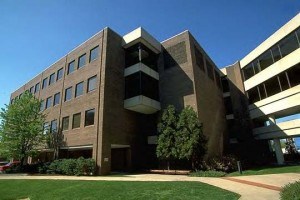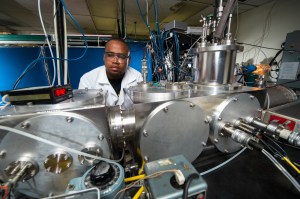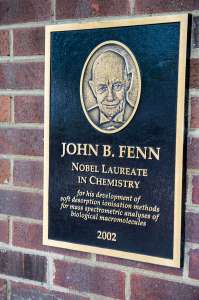About Us
 The Virginia Commonwealth University Department of Chemistry has 35 faculty members, approximately 70 graduate students, and more than 400 undergraduate chemistry majors. We recently introduced two new graduate programs in chemistry: An Accelerated BS+MS program as well as a non-thesis MS program in Chemistry to serve those that work in industry who want to further their education. We are also fully invested and participate in two interdisciplinary Ph.D. programs in Nanoscience and Nanotechnology and Chemical Biology in addition to our well-known Ph.D. program in Chemistry. The department has an active research program with more than $3 million annually in research and educational grants. We specialize in collaborative and interdisciplinary research in the fields of chemistry, chemical biology, chemical education, material science, and nanoscience and nanotechnology. Diversity, inclusion, and the desire to educate the next generation of students to solve complex scientific problems are among our greatest assets.
The Virginia Commonwealth University Department of Chemistry has 35 faculty members, approximately 70 graduate students, and more than 400 undergraduate chemistry majors. We recently introduced two new graduate programs in chemistry: An Accelerated BS+MS program as well as a non-thesis MS program in Chemistry to serve those that work in industry who want to further their education. We are also fully invested and participate in two interdisciplinary Ph.D. programs in Nanoscience and Nanotechnology and Chemical Biology in addition to our well-known Ph.D. program in Chemistry. The department has an active research program with more than $3 million annually in research and educational grants. We specialize in collaborative and interdisciplinary research in the fields of chemistry, chemical biology, chemical education, material science, and nanoscience and nanotechnology. Diversity, inclusion, and the desire to educate the next generation of students to solve complex scientific problems are among our greatest assets.
Mission Statement
The Chemistry Department of Virginia Commonwealth University is committed to the dual mission of teaching and research at the bachelor`s, master`s and doctoral level. In teaching, the purpose is to provide high quality education in chemistry to undergraduate as well as graduate students, in preparation for professional careers at all levels. In research, the goals are to advance the science of chemistry, to keep faculty on the forefront of the field, and to maintain an educational program consistent with the latest technology and development of the discipline. Service to the chemical profession is also an important aspect of the department`s activities.
Undergraduate programs
The department offers full-time undergraduate programs leading to the Bachelor of Science. The degree concentrations allow students to focus on different aspects of chemistry, depending on their specific interests. The concentrations include chemical science, professional chemist, professional chemist with honors, chemical modeling and biochemistry. Undergraduate research is a big component of our program and we encourage all of our majors to participate in undergraduate research opportunities, if at all possible. We recently added an Accelerated BS+MS program allowing qualified students to earn both the B.S. and M.S. in Chemistry in a minimum of five years by completing approved graduate courses during the senior year of their undergraduate program. VCU Chemistry ranks in the top 20 nationally in BS degrees in Chemistry, including those awarded to women and underrepresented minorities. Our dedicated chemistry advisors are highly connected with our students and help guide them through degree completion. We are also excited about the opening of a new STEM building in Fall 2023, which will feature instructional wet and dry labs and classrooms for teaching chemistry, biology, physics, math, psychology and kinesiology.
Graduate programs
 The department offers full- and part-time graduate programs leading to the Master of Science and Doctor of Philosophy degrees in analytical, inorganic, organic, and physical chemistry and to the doctoral degree in chemical physics. We specialize in collaborative and interdisciplinary research in the fields of chemistry, chemical biology, material science, and nanoscience and nanotechnology. Most of our students are funded through teaching assistantships, research assistantships, and scholarships. We offer a wide range of graduate courses, including those that are 1.5 credits, which are designed to allow students to focus on a sub-specialty in chemistry with maximum effectiveness; our courses are small in size and personal in nature. Diversity, inclusion, and the desire to educate the next generation of students to solve complex scientific problems are among our greatest assets.
The department offers full- and part-time graduate programs leading to the Master of Science and Doctor of Philosophy degrees in analytical, inorganic, organic, and physical chemistry and to the doctoral degree in chemical physics. We specialize in collaborative and interdisciplinary research in the fields of chemistry, chemical biology, material science, and nanoscience and nanotechnology. Most of our students are funded through teaching assistantships, research assistantships, and scholarships. We offer a wide range of graduate courses, including those that are 1.5 credits, which are designed to allow students to focus on a sub-specialty in chemistry with maximum effectiveness; our courses are small in size and personal in nature. Diversity, inclusion, and the desire to educate the next generation of students to solve complex scientific problems are among our greatest assets.
The recent addition of new degree programs, new faculty, revision of our graduate program requirements, and the acquisition of new instrumentation provides a firm basis for continued excellence in both teaching and research. A program of studies is tailored to the individual student and is designed to provide a sound background in all areas of chemistry, with emphasis on the student’s area of research. The low student-to-faculty ratio ensures that each student receives personal attention.
An important and distinctive feature of the department is close interaction between faculty and students. This interaction, in an active and friendly environment, is designed to promote scholarship, develop experimental ability and stimulate creative thought. Students work side by side with faculty members in small research groups. They are encouraged to present the results of their research at regional and national meetings of the American Chemical Society and other professional organizations.
Faculty
 The department is committed to excellence in both research and teaching. We have 35 faculty members dedicated to the teaching and training of undergraduates and/or graduate students. More than half conduct research in the areas of analytical, inorganic, organic, and physical chemistry as well as chemical biology, chemical education, chemical physics, and nanoscience with funding from the National Science Foundation, National Institue of Health, Department of Defense, among others. Faculty members have received training and experience at leading universities, industrial laboratories, and national research laboratories. Their excellent and diverse backgrounds ensure an undergraduate and graduate program of quality and balance. John B. Fenn, Nobel Laureate 2002, was a member of the Department of Chemistry faculty.
The department is committed to excellence in both research and teaching. We have 35 faculty members dedicated to the teaching and training of undergraduates and/or graduate students. More than half conduct research in the areas of analytical, inorganic, organic, and physical chemistry as well as chemical biology, chemical education, chemical physics, and nanoscience with funding from the National Science Foundation, National Institue of Health, Department of Defense, among others. Faculty members have received training and experience at leading universities, industrial laboratories, and national research laboratories. Their excellent and diverse backgrounds ensure an undergraduate and graduate program of quality and balance. John B. Fenn, Nobel Laureate 2002, was a member of the Department of Chemistry faculty.
Facilities
The Department has state-of-the-art instrumentation, which is used by graduate and undergraduate students in courses and research. Highlights include FT-IR and Raman spectrometers, ICP- and GC-mass spectrometers, GC, HPLC, and Ion chromatographic systems, electrochemical workstations, 400, and 600 MHz NMR instruments. The Department of Chemistry has two instrumentation directors who maintain the instrumentation and instruct users. For those interested in nanoscale materials, a state-of-the-art Nanomaterials Core Characterization (NCC) core facility is located down the street from the Chemistry Department housing SEM, TEM, and XPS among other material characterization tools. Students are trained to use the instruments themselves, providing a unique and practical educational objective.
Seminars
A weekly seminar program brings distinguished speakers to the department from academia and industry. Arrangements are made for the speakers to meet with students to discuss research and other topics. The program results in graduates well-prepared for careers in industry, academics and national research laboratories.